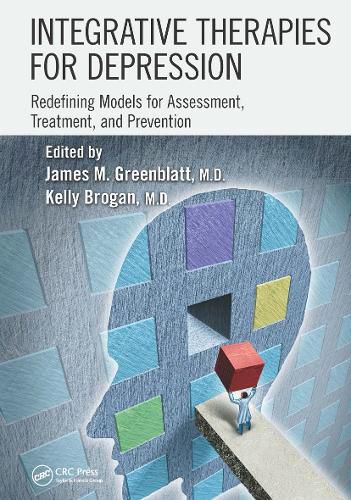Readings Newsletter
Become a Readings Member to make your shopping experience even easier.
Sign in or sign up for free!
You’re not far away from qualifying for FREE standard shipping within Australia
You’ve qualified for FREE standard shipping within Australia
The cart is loading…






Integrative Therapies for Depression: Redefining Models for Assessment, Treatment and Prevention summarizes emerging theories and research findings on various nonpharmaceutical therapies to treat mood disorders.
Supported by the review of nearly 3000 scientific studies, the book describes the concepts of inflammation, genetics, hormonal imbalance, gastrointestinal conditions, environmental stress, and nutritional deficiencies and their possible link to the pathogenesis of mood disorders.
It also examines findings on various nonpharmaceutical therapies used to treat mood disorders including vitamins, botanicals, and other natural products as well as exercise, stress reduction, bright light, mind-body practices, and spiritual approaches.
Also covered are evidence-based approaches to integrative management of mood disorders in pregnant women, adolescents, and the elderly. Separating facts from fiction, the book provides practical information that clinicians can implement and share with their patients.
The book fills a significant gap in the conventional model of therapeutics for mood disorders. It is a valuable resource for psychiatrists, psychologists, family therapists, and all other clinicians who devote their days to caring for those afflicted with depression.
$9.00 standard shipping within Australia
FREE standard shipping within Australia for orders over $100.00
Express & International shipping calculated at checkout
Integrative Therapies for Depression: Redefining Models for Assessment, Treatment and Prevention summarizes emerging theories and research findings on various nonpharmaceutical therapies to treat mood disorders.
Supported by the review of nearly 3000 scientific studies, the book describes the concepts of inflammation, genetics, hormonal imbalance, gastrointestinal conditions, environmental stress, and nutritional deficiencies and their possible link to the pathogenesis of mood disorders.
It also examines findings on various nonpharmaceutical therapies used to treat mood disorders including vitamins, botanicals, and other natural products as well as exercise, stress reduction, bright light, mind-body practices, and spiritual approaches.
Also covered are evidence-based approaches to integrative management of mood disorders in pregnant women, adolescents, and the elderly. Separating facts from fiction, the book provides practical information that clinicians can implement and share with their patients.
The book fills a significant gap in the conventional model of therapeutics for mood disorders. It is a valuable resource for psychiatrists, psychologists, family therapists, and all other clinicians who devote their days to caring for those afflicted with depression.